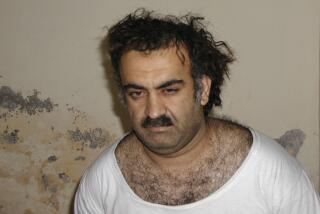More than 50 Guantanamo detainees to be tried in U.S. courts, Holder says
- Share via
WASHINGTON — Atty. Gen. Eric H. Holder Jr. said Wednesday that about one-fourth of the remaining detainees at Guantanamo Bay, Cuba, could be tried in U.S. courts -- a number lower than the Pentagon previously had estimated.
Under the Bush administration, the Defense Department projected it could try as many as 80 Guantanamo detainees before military commissions. A fourth of the current population of 229 would be about 57 people.
The new estimate came during a Senate Judiciary Committee hearing, when Sen. Lindsey Graham (R-S.C.) asked Holder whether one-fourth of the detainees stand to be tried before military commissions or federal courts. Holder replied: “That might be about right.”
“I don’t think we are going to have a very huge number” brought to trial, Holder said.
Critics contend that some detainees that the Bush administration intended to put on trial were low-level functionaries or foot soldiers who should not be charged with war crimes.
And human rights groups and lawyers have maintained that the evidence against many others is deeply flawed.
In the absence of trials, the Obama administration could be faced with holding a number of accused terrorists on a long-term basis without trials.
“The more guys you try, the less you have to militarily detain,” said Charles Stimson, a scholar at the Heritage Foundation who handled detainee issues in the George W. Bush administration.
Holder cautioned that the administration did not know how many, if any, detainees would have to be held without trial.
But he said that attorneys have been working on plans for federal court reviews of findings that suspects must be held without trial. The courts then would conduct periodic reviews.
Holder said the administration would “work with” Congress on long-term detention but did not say whether the administration would seek legislation.
Some administration officials believe that the law authorizing U.S. military force in Afghanistan provides for long-term detention without further congressional action.
On a related issue, the Senate on Wednesday passed a measure sponsored by Graham to ban the release of photographs of U.S. troops abusing detainees.
Such a ban had been approved by the Senate as part of a bill funding the wars in Iraq and Afghanistan. But faced with stiff opposition in the House, the ban was dropped from the final version of the war funding bill.
In protest, Graham threatened to block the war funding. He backed down after Senate Majority Leader Harry Reid (D-Nev.) assured him the Senate would vote on the proposed ban.
--
Janet Hook in the Washington bureau contributed to this report.
More to Read
Sign up for Essential California
The most important California stories and recommendations in your inbox every morning.
You may occasionally receive promotional content from the Los Angeles Times.










